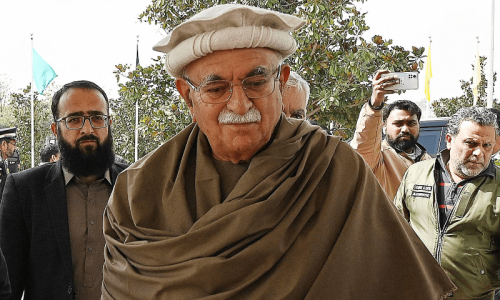AT the start of this year, Pakistan launched a new National Security Policy, the first to take a holistic view of security. That document acknowledged climate change and water stress as key drivers of insecurity in our country.
In the following months, Pakistan experienced unprecedented heatwaves and flooding that now threaten food security and public health and are spurring internal displacement and migration that can be precursors to increased urban violence and persistent conflict.
Flash forward to this month, when Pakistan emerged as a force at COP27. Prime Minister Shehbaz Sharif made a compelling plea for climate justice. Minister for Climate Change Sherry Rehman admirably chaired the G77 to secure the establishment of a ‘loss and damage’ fund, a historic achievement.
The political détente that all hope will follow the army chief’s appointment — and that too in the wake of COP27 — offers a rare window for our powers to be to reach an agreement on the need to prioritise climate change mitigation and adaptation. There can be no better course to securing Pakistan’s security and stability. Helpfully, there is broad agreement in civilian and military spheres that this topic — particularly water scarcity — needs more attention. But there’s still a lot to do.
The security policy forwards a geo-economic agenda — the idea that Pakistan should use its strategic position to drive prosperity. A stronger economy is reframed as a security imperative, needed to fund defence and deterrence. This pro-growth vision sits well with the PML-N’s Punjab-centric business and infrastructure focus.
Economic growth must be reframed in the context of climate justice.
In the name of facilitating growth (and cutting import bills), in the weeks before leaving for Sharm El Sheikh to preach climate justice, Sharif inaugurated a coal project, lauded as a ‘game changer’ and cash saver. And as political challenges reduce from a boil to a simmer, CPEC is back in the headlines: while meeting Recep Erdogan last week, Sharif invited Turkey to join the corridor.
The calls to build infrastructure and grow the economy will resonate in a country still reeling from the floods. But this growth must now be reframed in the context of Pakistan’s calls — and urgent need — for climate justice.
Here too, there is hope. The national security policy calls for a “climate-resilient Pakistan that prioritises climate adaptation, sustainable water management, and disaster preparedness”. It recognises that future development must be climate resilient, and that this will require adequate resource allocation.
Meanwhile, it is clear that the COP27 discourse resonated with Sharif. While asking Turkey to join CPEC and celebrating increased defence cooperation between Islamabad and Istanbul, he also specifically invited Turkey and Turkish businesses to invest in renewable energy projects in Pakistan, with reference to the dual goals of cutting import bills and emissions.
A more consistent and integrated approach to climate change mitigation and adaptation, including agreements about how resources for this are generated and allocated, is now needed. This approach needs to be consistent across all Pakistani institutions, including, for example, the judiciary, which should take firmer views on development projects that are not environmentally sound, and provincial education ministries in terms of including climate-linked content in the public curriculum.
This holistic and consistent approach will be necessary in the coming years for Pakistan to bear the fruit of the seeds it planted at COP27.
Even the most generous COP-watchers acknowledge that this conference failed with respect to agreeing a phase-out plan for fossil fuels and implementing a realistic path to limiting heating to 1.5 degrees Celsius. Climate action will intensify with every disaster, and it will continue to target high-emitting activities linked to fossil fuel use. This will affect climate finance disbursements.
While a loss and damage fund has been agreed to, no details will be finalised until COP28 next November. It remains to be seen who will pay into the fund, who will be eligible for funding, and who will govern the funds. One thing is probable: high and unapologetic emitters are unlikely to receive significant financial support without emissions reductions requirements. It is difficult to demand both reparations and the right to emit.
At some point in the next decade, there will also be greater demands for transparency regarding the military’s carbon footprint. Scientists for Global Responsibility estimated in 2021 that the world’s militaries and the industries that supply them contribute six per cent of all emissions; however, military emissions are not required to be reported — yet. Let’s hope that by the time such action is needed, all of Pakistan is equally committed to mitigation, adaptation and the route to a just transition.
The writer is a political and integrity risk analyst.
Twitter: @humayusuf
Published in Dawn, November 28th, 2022
















































